|
|
|
Sort Order |
|
|
|
Items / Page
|
|
|
|
|
|
|
| Srl | Item |
| 1 |
ID:
178914


|
|
|
|
|
| Summary/Abstract |
Since the CIA’s inception, elements of the Agency have researched, used, and taught interrogation tactics for national security and counterterrorism purposes. These have sometimes constituted torture, cruel, inhuman, or degrading treatment, and ethical violations. Using the lens of Institutional Change Theory and investigating critical junctures in CIA history, this paper shows that a lack of meaningful internal and external oversight and accountability measures can explain the CIA’s recurrent use and propagation of torture and abuse in interrogation. These findings have implications for future counterterrorism interrogation policy, and preventing the use of ineffective, unethical techniques
|
|
|
|
|
|
|
|
|
|
|
|
|
|
|
|
| 2 |
ID:
126635
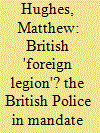

|
|
|
|
|
| Publication |
2013.
|
| Summary/Abstract |
The men of the British section of the Palestine police have romantically imagined their time as officers in Mandate Palestine, a land infused with historical and biblical significance. Many compared their service to that of the famed military force, the French Foreign Legion. This study sets the nostalgia of memory against the reality of service in Palestine, one that involved considerable brutality against local people. This essay details the empirical evidence of violence, including torture and a 'dirty war', mining archival sources, contextualizing primary source material within wider notions of British ideas of collective punishment within the empire. The Palestine police failed in its job of policing, necessitating the deployment of the army to Palestine, and with this collapse in police control the force became more violent. Ironically, the reality of life in the Palestine police was similar to that in the French Foreign Legion: a shock force there to maintain imperial control. The article argues that policing methods from the Mandate period continued after the Palestine force was disbanded in 1948, both within Israel and in other parts of the British Empire where demobilized Palestine police officers went to serve. It pushes the current paradigm on policing, extending the literature that details reforms and institutional change in the Palestine police to include the impact on local people.
|
|
|
|
|
|
|
|
|
|
|
|
|
|
|
|
| 3 |
ID:
111852
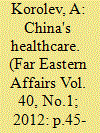

|
|
|
|
|
| Publication |
2012.
|
| Summary/Abstract |
Transition used to be seen as a unidirectional process: from plan to market, from public to private, from collective to individual. This research, on the contrary, focuses on the process of re-transition from over-marketization to a new form of state regulation in China's healthcare sector. Such process started in 2002 and included attempts to make provision of healthcare service a publicly funded industry.
The new reform in China's healthcare sector is presented as a process of development of four medical insurance nets, namely UEBMI, NCMS, URBMI and BMI for migrant workers, and their subsequent integration into a universal coverage plan adopted in March 2009. It is demonstrated that after more than 20 years of marketization, Chinese leaders attempt to reengage with healthcare sector and make it effective instrument of state building.
|
|
|
|
|
|
|
|
|
|
|
|
|
|
|
|
| 4 |
ID:
158282


|
|
|
|
|
| Summary/Abstract |
Institutional legitimacy is often treated as a characteristic of an institution that generates authority, implying relative consistency across time and contexts. However, legitimacy is intrinsically relational and remains sensitive to changing political conditions and subjective perceptions. Introducing temporal and subjective dynamics of institutional legitimacy, this article applies greater conceptual precision to determining the role of legitimacy in shaping institutional change. It highlights how changing political conditions and subjective contestation over institutional authority routinely disrupts institutional legitimacy, resulting in cycles of institutional legitimacy in which institutions must navigate between pressures to adapt and obstructive disagreements over the direction and intensity of adaptation. The resulting conceptual framework provides insights into how institutional change is instigated, negotiated, and implemented that are missing from the current literature. I analyze the evolution of United Nations (UN) humanitarian intervention policy to elucidate how the dynamics of institutional legitimacy have shaped UN policy reforms since the Cold War and to illustrate how future scholars can tailor this framework to determine the extent to which legitimacy dynamics govern the trajectory of a variety of other international institutions.
|
|
|
|
|
|
|
|
|
|
|
|
|
|
|
|
| 5 |
ID:
177185
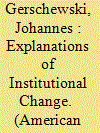

|
|
|
|
|
| Summary/Abstract |
Previous research on institutional change has concentrated on two types of explanations. On one hand, the dualism of path dependency and critical junctures has advanced our understanding of how institutional change occurs due to sudden exogenous shocks. On the other hand, more recent critiques have established a better understanding of endogenous, gradual change. This article is motivated by observations that current research tends to overlook what I call the “missing diagonal.” I argue that we need to disentangle the sources of a cause (exogenous vs. endogenous) from its time horizon (sudden vs. gradual). By cross-tabulating these two dimensions, the proposed typology of institutional change explanations is able to capture complex multilayered as well as sequential arguments of institutional change. The typology urges scholars to be more precise with their social science language of erosion and decay, while serving as a generator for an innovative research agenda on endogenous ruptures.
|
|
|
|
|
|
|
|
|
|
|
|
|
|
|
|
| 6 |
ID:
137416


|
|
|
|
|
| Summary/Abstract |
The financing of Common Security and Defence Policy (CSDP) operations questions the capacity of the European Union (EU) to contribute to crisis management. Instead of a single mechanism that would be used for all kinds of missions, different mechanisms are applied, depending on the objective and nature of the operation. The aim of this article is to explain change and inertia in the way these operations are funded. The first section is dedicated to the presentation of the legal framework and its characterization as a fragmented and flexible structure. It allows for identifying the changes that have affected the financing of EU operational activities abroad. The main problems and challenges in financing CSDP operations are dealt with in the second section. The third section explains: (1) why changes have occurred in some areas and (2) why inertia has prevailed in other areas in spite of the problems previously identified. Three main explanations are tested. Rules and practices in financing CSDP operations (1) result from operational needs, (2) are influenced by proactive supranational institutions and (3) are triggered by the Member States. These three explanations are not mutually exclusive. They all contribute to the understanding of CSDP operations, but the relative importance of each factor depends on the operations at hand. Generally, the second factor is at play in the case of civilian operations, while the third one prevails with regard to military operations. The first factor brings a complementary explanation to both kinds of operations.
|
|
|
|
|
|
|
|
|
|
|
|
|
|
|
|
| 7 |
ID:
115708


|
|
|
|
|
| Publication |
2012.
|
| Summary/Abstract |
What explains Germany's exceptional labor market performance during the Great Recession of 2008-09? Contrary to accounts that emphasize employment protection legislation or government policy (i.e., short-time work), this article argues that actions by firms-embedded in ever-changing coordinative institutional structures-were crucial. Firms chose to keep rather than shed labor, a strategy induced by (i) a "toolkit" of flexible labor market instruments that had evolved incrementally over the past thirty years; (ii) wage restraint and successful internal restructuring of firms during the past decade, which fueled an export boom before the crisis. Firms thus had some margin for maneuver, using internal flexibility to protect their investment in skilled workers. These and other institutional changes driven by firms reflect a process of successful adaptation to external economic challenges, but did not fundamentally undermine Germany's coordinated form of capitalism. The result is not a new German model that was purposefully designed; instead German firms slowly discovered new ways to cope with economic challenges.
|
|
|
|
|
|
|
|
|
|
|
|
|
|
|
|
| 8 |
ID:
137643
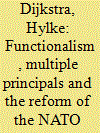

|
|
|
|
|
| Summary/Abstract |
The literature on international organizations tells us that diverging member states’ preferences and concerns about the loss of control are major obstacles to institutional reform. But what if changes in the international environment necessitate institutional reform? This article examines such dilemma in the case of the North Atlantic Treaty Organization (NATO). NATO has faced functional pressures to adjust its machinery to the post-Cold War era, but has at the same time seen its membership and the preference heterogeneity of the membership increase. The article finds that institutional change is indeed difficult with multiple principals and uncertainty about the consequences of reform. Yet modest reform has still taken place. Firstly, strong functional pressures can help the member states to overcome their differences concerning institutional reform. Secondly, lower-level incremental reforms, beyond the control of the member states, have made NATO a more efficient organization. The empirical focus is on the development of the understudied International Staff post-1989.
|
|
|
|
|
|
|
|
|
|
|
|
|
|
|
|
| 9 |
ID:
181197
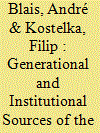

|
|
|
|
|
| Summary/Abstract |
Why has voter turnout declined in democracies all over the world? This article draws on findings from microlevel studies and theorizes two explanations: generational change and a rise in the number of elective institutions. The empirical section tests these hypotheses along with other explanations proposed in the literature—shifts in party/candidate competition, voting-age reform, weakening group mobilization, income inequality, and economic globalization. The authors conduct two analyses. The first analysis employs an original data set covering all post-1945 democratic national elections. The second studies individual-level data from the Comparative Study of Electoral Systems and British, Canadian, and US national election studies. The results strongly support the generational change and elective institutions hypotheses, which account for most of the decline in voter turnout. These findings have important implications for a better understanding of the current transformations of representative democracy and the challenges it faces.
|
|
|
|
|
|
|
|
|
|
|
|
|
|
|
|
| 10 |
ID:
175815
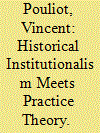

|
|
|
|
|
| Summary/Abstract |
The selection process leading to the appointment of Antonio Guterres as Secretary-General of the United Nations gave way to unprecedented practices in world politics, such as public hearings with candidates. A textbook case of what historical institutionalism calls “layering,” this episode of institutional development features intriguing puzzles, including its timing, form, and limits. Drawing on historical institutionalism and practice theory, I develop a “pulling” theory of agency that complements intentionalist accounts. The webs of practices that agents find themselves in afford certain actions over others, orienting the push of interests. I infer three mechanisms—relational crossover, competence transfers, and pushback—and show how a set of nine practices, available at the UN in 2015–2016 but not in earlier episodes, account for the specifics of the recent renewal of the Secretary-General's selection procedure. A full explanation of this critical case of institutional change is impossible without understanding how agents struggled with one another under the pull of the UN web of practices, affording some innovations but not others.
|
|
|
|
|
|
|
|
|
|
|
|
|
|
|
|
| 11 |
ID:
186534
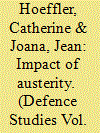

|
|
|
|
|
| Summary/Abstract |
While much scholarship takes austerity-driven spending cuts as evidence of policy change, this paper shifts the focus to interrogate whether these budgetary cuts lead to actual policy change and if so how. Scholarships on institutional change and public policy illuminate how state actors mediate policy change through coping strategies, i.e. strategies by which state actors try to minimize budget decreases’ negative impacts on policy. Taking French Defense Policy as an unlikely case of policy change, we show that state actors have adopted three types of coping strategies to minimize the spending cuts’ impact: compensation, delaying, and re-categorizing acquisition procedures. These coping strategies have however contributed to a process of incremental change, which most of time is non-cumulative and creates additional policy problems. This article contributes to a better understanding of change underway in defense policies, but also more generally to literatures pertaining to austerity and policy change.
|
|
|
|
|
|
|
|
|
|
|
|
|
|
|
|
| 12 |
ID:
154513


|
|
|
|
|
| Summary/Abstract |
This article shows how bureaucratic discretion in the implementation of Nigeria's power-sharing institutions, the Federal Character, has led to the formalization of local informal norms on belonging. Under the Federal Character, Nigerians have to be ‘indigenes’ to access certain economic and political opportunities at the federal as well as state and local government levels. However, what makes a person indigenous is not formally defined, leaving street-level officials free to decide how to allocate indigeneship certificates. Using original qualitative and quantitative data on Kano, northern Nigeria's largest city, this article shows that local officials faced with this discretion often turn to locally salient norms on belonging. In Kano, several of these norms set ethnic and religious criteria for belonging, particularly those that prioritize the rights of the ‘native’ over those of the citizen. The article demonstrates how street-level bureaucrats use these ethnic and religious criteria to allocate indigeneship certificates, prioritizing Kano's ‘natives’ over other Nigerian citizens. This dynamic may be mirrored across Nigeria, depending on the norms on belonging that are locally salient. While the article suggests a simple technical solution – formally defining indigeneship on the basis of residence – it also shows the deep political barriers to its implementation.
|
|
|
|
|
|
|
|
|
|
|
|
|
|
|
|
| 13 |
ID:
152166
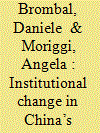

|
|
|
|
|
| Summary/Abstract |
Over the past decade, the concept of sustainable development has gained increasing importance within China’s urban development. Urban(ising) China not only catalyses many of the country’ sustainability issues, but also constitutes the locus where novel institutional arrangements for sustainable development are tested and implemented. This paper explores new paradigms of integrated territorial management unfolding in areas where concerns of water pollution intersect with objectives of urban renewal. The analysis focuses on the case of the Lihu Lake basin, located in the city of Wuxi (Jiangsu Province), considered by many observers to be at the forefront in China’s quest for sustainable urban development. In Lihu the integration of environmental management with urban planning has led to the creation of a new organisational field, revolving around the issue of sustainable development of urban areas, with distinctive regulatory, normative, and cognitive aspects. While epitomising a case of integrated territorial management, the experience of Lihu Lake basin highlights the challenge of fostering inclusive social development in urban areas.
|
|
|
|
|
|
|
|
|
|
|
|
|
|
|
|
| 14 |
ID:
135084
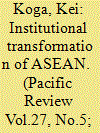

|
|
|
|
|
| Summary/Abstract |
Many international relations (IR) scholars discuss whether the Association of Southeast Asian Nations (ASEAN) possesses institutional utility in maintaining security in Southeast Asia or East Asia. While this has important implications for both academics and policy-makers, ASEAN's role has been too often evaluated in terms of what has persisted within the association rather than what changed. Yet, exploring the causes and processes of institutional transformation are particularly important because they have made ASEAN expand its security utility by creating security dialogues and fostering security cooperation in the region. In this context, the crucial question is: when and how has ASEAN changed?
Focusing on the causes and processes of institutional transformation which have occurred within ASEAN, this article explores ASEAN's transformation from 1968 to 1976, by using a theoretical model, developed from historical institutionalism and the punctuated equilibrium model. Applying this approach to institutional transformation of ASEAN in the political-security field, three transformation processes are constructed. First, ASEAN member states’ expected changes in the external security environment triggered internal discussions regarding ASEAN's political-security function; second, these internal political discussions fostered institutional consolidation of ASEAN during this period; and third, such direction of institutional transformation was fundamentally guided by ideas provided by institutional norm entrepreneurs (INEs), especially Malaysia's neutrality proposal.
In particular, this article examines the process of ASEAN's creation of the Zone of Peace, Freedom, and Neutrality (ZOPFAN) in 1971, and the Treaty of Amity and Cooperation (TAC) and the Bali Concord in 1976, and argues that this model shed light on the significance of ZOPFAN that created a foundation of TAC and the Bali Concord, for which conventional wisdom has dismissed as an insignificant institutional concept by academics and practitioners.
|
|
|
|
|
|
|
|
|
|
|
|
|
|
|
|
| 15 |
ID:
101312


|
|
|
|
|
| Publication |
2010.
|
| Summary/Abstract |
In this article, we analyze the process of institutional change in Taiwan's disability field by focusing on the role of social movements. An institutional perspective emphasizes how a particular logic in an organizational field generates formal and informal institutions that define how persons with disabilities are treated in a society. Before the 1990s, the charity model was dominant, and later it came to be challenged by the disability movement, which advocated for the social model. We argue that the transition to a social model was a major achievement by disability organizations, which successfully combined the dual roles of advocate and service provider. By making strategic use of welfare privatization in the 1990s, they were able to mobilize a series of lobbying campaigns. Their efforts culminated in the passing of the Physically and Mentally Disabled Citizens Protection Act in 1997, which marked the beginning of the social model in Taiwan.
|
|
|
|
|
|
|
|
|
|
|
|
|
|
|
|
| 16 |
ID:
103953
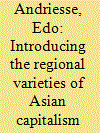

|
|
|
| 17 |
ID:
159328


|
|
|
|
|
| Summary/Abstract |
In recent years, Japan's foreign policy elite has started to increasingly securitize China in their security discourse. The harsher tone from Tokyo is widely evaluated as a direct reaction to China’s own assertive behavior since 2009/2010. Yet, the change in the Japanese government’s rhetoric had started changing before 2010. In order to close this gap, the present article sheds light on an alternative causal variable that has been overlooked in the literature: a change in Japan’s security institutions, more specifically, the upgrade of the Defense Agency to the Ministry of Defense, in 2007. While utilizing discursive institutionalism and securitization-approaches, the present article demonstrates that a strong correlation indeed exists between the institutional shift and the change in Japan’s defense whitepapers in the 2007–10 period. It thus opens up a research avenue for the further scrutiny of the hitherto understudied but significant causal linkage in the study of contemporary Japanese security policy toward China.
|
|
|
|
|
|
|
|
|
|
|
|
|
|
|
|
| 18 |
ID:
157611


|
|
|
|
|
| Summary/Abstract |
Why are some institutional designs perceived as more legitimate than others, and why is the same institutional design sometimes perceived as legitimacy-enhancing in one setting and not in another? In a world in which most international organisations (IOs) do not fully embody societal values and norms, such as democratic participation and equal treatment, why do legitimacy deficits in some organisations lead to pressure for institutional change while in others they are tolerated? These are important questions given that many analysts have diagnosed a ‘legitimacy crisis’ of IOs, but we argue that existing approaches are ill equipped to answer them. We show that the existing legitimacy literature has an implicit model of institutional change – the congruence model – but that this model has difficulty accounting for important patterns of change and non-change because it lacks microfoundations. We argue that attributions of legitimacy rest on perceptions and this implies the need to investigate the cognitive bases of legitimacy. We introduce a cognitive model of legitimacy and deduce a set of testable propositions to explain the conditions under which legitimacy judgments change and, in turn, produce pressures for institutional change in IOs.
|
|
|
|
|
|
|
|
|
|
|
|
|
|
|
|
| 19 |
ID:
105042
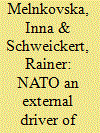

|
|
|
|
|
| Publication |
2011.
|
| Summary/Abstract |
So far, economic analyses of NATO enlargement have been restricted to aspects of regional security while political analyses focused on indirect peace-building effects on democracy in the first place. Our panel regressions for 25 post-communist countries for the period from 1996 to 2008 reveal that direct incentives provided by NATO pre-accession are important for broad-based institutional development. Results are even more robust than for variables measuring EU pre-accession or NATO membership effects. This supports the argument that NATO can act as a transformative power and should strengthen its political agenda.
|
|
|
|
|
|
|
|
|
|
|
|
|
|
|
|
| 20 |
ID:
175456


|
|
|
|
|
| Summary/Abstract |
In recent years, NATO expressed increasing interest in addressing the broader range of security challenges confronting its Allies. Energy security was included in 2010 in the NATO Strategic Concept and in the following years NATO developed its mandate in energy security. This research resorts to process tracing to capture the interaction between factors that led to NATO developing a mandate in energy security. NATO Member States, particularly Central and Eastern European countries, played an important role in NATO working on energy security. The NATO bureaucracy also supported the organisation in developing a mandate in this field. The study finds rational choice institutionalism particularly useful in explaining the expansion of the NATO mandate in energy security and contributes in this way to the ongoing debate on which theoretical approach best explains the contemporary evolution of NATO. The research is based on original data collected through fieldwork and interviews conducted at the NATO headquarters with high NATO officials working on energy security (including NATO Deputy Secretary Generals and NATO heads of sections), as well as with high officials from NATO Member States.
|
|
|
|
|
|
|
|
|
|
|
|
|
|
|
|
|
|
|
|
|